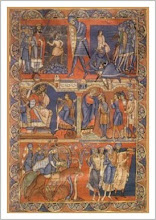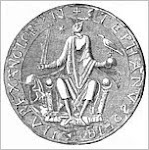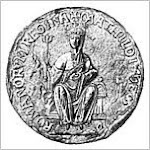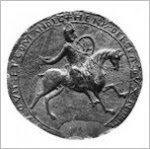• Geoffrey de Mandeville II, 1st Earl of Essex - Rohese de Vere
Geoffrey de Mandeville II
Birth: -
Death: 1144
Burial: Temple Church, London
Father: William de Mandeville
Mother: Margaret, daughter of Eudo de Rie also called Eudo (Dapifer) and Rohese de Clare
Marriage: Rohese de Vere, daughter of Aubrey de Vere II
Children:
Ernulf, disinherited, exiled for supporting his father in rebellion
Geoffrey III, 2nd earl of Essex (d.1166)
William II, 3rd earl of Essex and Count of Aumale (d.1189)
Robert (d. c.1189)
NOTES: It seems Geoffrey was not only a bit of a rogue but he also took great delight in playing both Stephen and Matilda, The Empress, until he met his demise in 1144. He changed sides more than once and his prime objective, at least in the beginning, seems to have been the restoration of his family's estates which had been seized by Henry I after his father, William de Mandeville, fell foul of the king. He at first supported Stephen who duly made him Earl of Essex in late 1139 or during 1140 and then in 1141 appointed him custodian of the White Tower in London.
He, like many barons, supported Matilda after Stephen's defeat at the Battle of Lincoln and she reconfirmed his possessions and granted him the Norman lands of his paternal grandfather, Eudo de Rie (Dapifer), and appointed him sheriff of Essex, Hertfordshire, Middlesex and London. After Stephen's release he turned his support back to the King but it must have been shortlived because he rebelled and Stephen confiscated his castles in 1143.
During 1143 and 1144 Geoffrey set up his headquarters in the fen country of East Anglia and used the Isle of Ely and Ramsey Abbey as a base for his rebel operations. From this position it was difficult for Stephen to effectively contain Geoffrey's activities, although he was eventually besieged by Stephen. Geoffrey died in September 1144, the result of an arrow wound he had received in a skirmish while attacking Burwell Castle in August 1144.
30 July 2010
Subscribe to:
Post Comments (Atom)








No comments:
Post a Comment